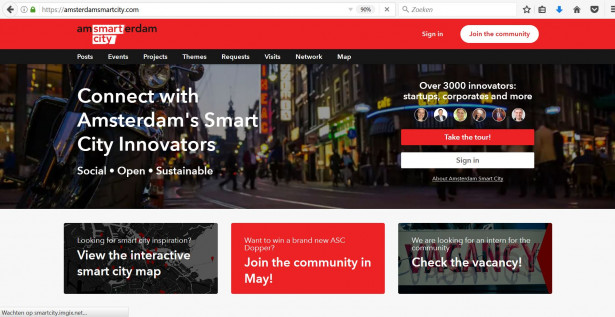Stay in the know on all smart updates of your favorite topics.
(GESLOTEN) Vacature: Communicatie- en Programmamedewerker Amsterdam Smart City (32 uur)

Ben jij thuis in de wereld van communicatie en event management? En gaat jouw hart sneller kloppen van duurzaamheid, stedelijke innovatie en netwerken?
Kom dan als junior Communicatie- en Programmamedewerker het team van Amsterdam Smart City versterken!
Wie zijn wij?
Amsterdam Smart City is een onafhankelijk innovatieplatform, dat innovatieve bedrijven, kennisinstellingen, maatschappelijke organisaties, overheden en proactieve bewoners samenbrengt en de stad van de toekomst vormgeeft. Amsterdam Smart City maakt als programma deel uit van Amsterdam Economic Board.
Samen met 29 partners werken wij aan een betere, duurzame en toekomstbestendige wereld. Daarnaast brengen we een internationale community samen van meer dan 9.000 innovatieprofessionals, studenten en geïnteresseerden. Zij ontmoeten elkaar rond verschillende thema’s en helpen elkaar verder. Door al deze partijen te verbinden, en met hen het gesprek te voeren over de grote uitdagingen in onze regio, komen we tot nieuwe verhalen en innovatieve oplossingen die bijdragen aan betere straten, buurten en steden. We richten ons met name op vier transitiethema’s: Mobiliteit, Digitaal, Energie en Circulair.
Hier staan wij voor
Iedereen is anders, en juist met verschillende mensen werken wij nog beter aan de metropool van morgen. We zijn nieuwsgierig naar jouw talenten, wat jou bijzonder maakt. We horen graag jouw ideeën en perspectieven. Dat helpt ons om samen nog meer impact te maken.
Wat ga je doen?
Je beheert onze online kanalen en je organiseert samen met het team evenementen. Met verslaglegging, enthousiasme en het maken van nieuwe connecties binnen ons netwerk versterk je ons regionale en internationale netwerk! Je werkt nauw samen met- en ondersteunt het hele Amsterdam Smart City team en de programmadirecteur. Dit zijn je taken:
Beheer en schrijven van onze wekelijkse nieuwsbrief en LinkedIn content. Je neemt initiatieven om de interactie en het bereik te vergroten.
Je houdt toezicht op de berichten op het online platform en je stimuleert leden om content te plaatsen
Beheer info mailbox (inkomende verzoeken, vragen etc.)
Ondersteuning inhoudelijke verslaglegging netwerkevenementen en werksessies, en het opmaken van presentaties
Praktische ondersteuning bij evenementen (locaties, uitnodigingen, communicatie)
Ondersteuning bij het organiseren van werksessies en het bouwen van coalities
Wie ben jij?
Je hebt wo/hbo werk- en denkniveau, een opleiding in de richting van communicatie (of vergelijkbaar);
Je hebt 1-2 jaar werkervaring en ervaring op het gebied van online communicatie/community en/of event management
Je beheerst de Nederlandse en Engelse taal uitstekend in woord én geschrift
Je hebt affiniteit met duurzaamheid, innovatie en stedelijke ontwikkelingen en je vindt het belangrijk om met je werk maatschappelijke impact te maken.
Je beschikt over voldoende algemene kennis over bovenstaande en je kan hier helder over schrijven.
Je bent proactief en nieuwsgierig
Je bent sociaal, enthousiast en houdt van netwerken en verbinden.
Wat bieden wij?
Wij bieden je een fijne werkplek op het Marineterrein in Amsterdam, met een informele en collegiale sfeer. We zijn een klein team dat nauw met elkaar en onze partners samenwerkt.
Je wordt deel van een enorm divers en dynamisch netwerk van koplopers en pioniers in stedelijke innovatie van toonaangevende organisaties in de Metropool Amsterdam. Er is veel ruimte om te leren van collega’s en specialisten uit het netwerk en je te verdiepen in de thema’s die jou interesseren. Samen leren we door te doen!
Daarnaast bieden wij:
Een functie voor 32 uur per week;
Een half-jaar-contract met uitzicht op verlenging;
Salarisindicatie €3.300 - €3.500 bruto per maand (o.b.v. 40 uur), aangevuld met vakantie- en eindejaarstoeslag.
Interesse gewekt?
Ben je enthousiast? Dan horen we graag van je! Stuur je CV en een korte motivatie uiterlijk 4 april per mail aan solliciteren@amecboard.com. De eerste gesprekken vinden plaats op 10 en 12 april. Vervolggesprekken zijn in de ochtend van 19 april. Een schrijfopdracht maakt deel uit van de procedure. Neem voor meer informatie over de functie contact op met Pelle Menke. Hopelijk spreken we elkaar snel!
Demoday #22: Data Commons Collective
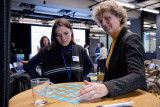
In the big tech-dominated era, data has been commercially exploited for so long that it is now hard to imagine that data sharing might also benefit the community. Yet that is what a collective of businesses, governments, social institutions and residents in Amsterdam aim to do. Sharing more data to better care for the city. On behalf of the Data Commons Collective, Lia Hsu (Strategic Advisor at Amsterdam Economic Board) asked the Amsterdam Smart City network for input and feedback on their Data Commons initiative on the last Demoday of 2023.
What is a (data) common?
Commons are natural resources that are accessible to everyone within a community. Water. Fertile soil. Clean air. Actually everything the earth has given us. We as humanity have increasingly begun to exploit these commons in our pursuit of power and profit maximisation. As a result, we risk exhausting them.
Data is a new, digital resource: a valuable commodity that can be used to improve products and services. Data can thus also be used for the common good. However there are two important differences between a common and a data common: data in commons never runs out, and data in commons is not tied to any geographical location or sociocultural groups.
Four principles for Data Commons
The Data Commons collective is currently working on different applied use cases to understand how data commons can help with concrete solutions to pressing societal problems in the areas of energy, green urban development, mobility, health and culture. Each data commons serves a different purpose and requires a different implementation, but there are four principles that are always the same:
- The data common is used to serve a public or community purpose
- The data common requires cooperation between different parties, such as individuals, companies or public institutions
- The data common is managed according to principles that are acceptable to users and that define who may access the data commons under what conditions, in what ways they may be used, for what purpose, what is meant by data misuse
- The data common is embedded to manage data quality, but also to monitor compliance with the principles and ensure that data misuse is also noticed and that an appropriate response (such as a reprimand, penalty or fine) follows.
The Data Commons Collective is now in the process of developing a framework, which provides a self-assessment tool to guide the formation of Data Commons initiatives by triggering consideration of relevant aspects for creating a data commons. It is a means of reflection, rather than prescription, to encourage sustainable and responsible data initiatives.
Energy Data Commons case and Value Workshop by Waag
After the introduction to the Data Commons Collective and Framework by Simone van der Burg (Waag) and Roos de Jong (Deloitte), the participants engaged in a value workshop led by Simone. The case we worked with: we’re dealing with a shortage of affordable and clean energy. Congestion issues are only expected to get worse, due to increased energy use by households en businesses. An energy Data Commons in neighbourhoods can have certain benefits. Such as preventing congestion issues, using clean energy sources more effectively, becoming self-sufficient as a neighbourhood and reducing costs. But under what circumstances would we want to share our energy data with our neighbours? What are the values that we find important when it comes to sharing our energy data?
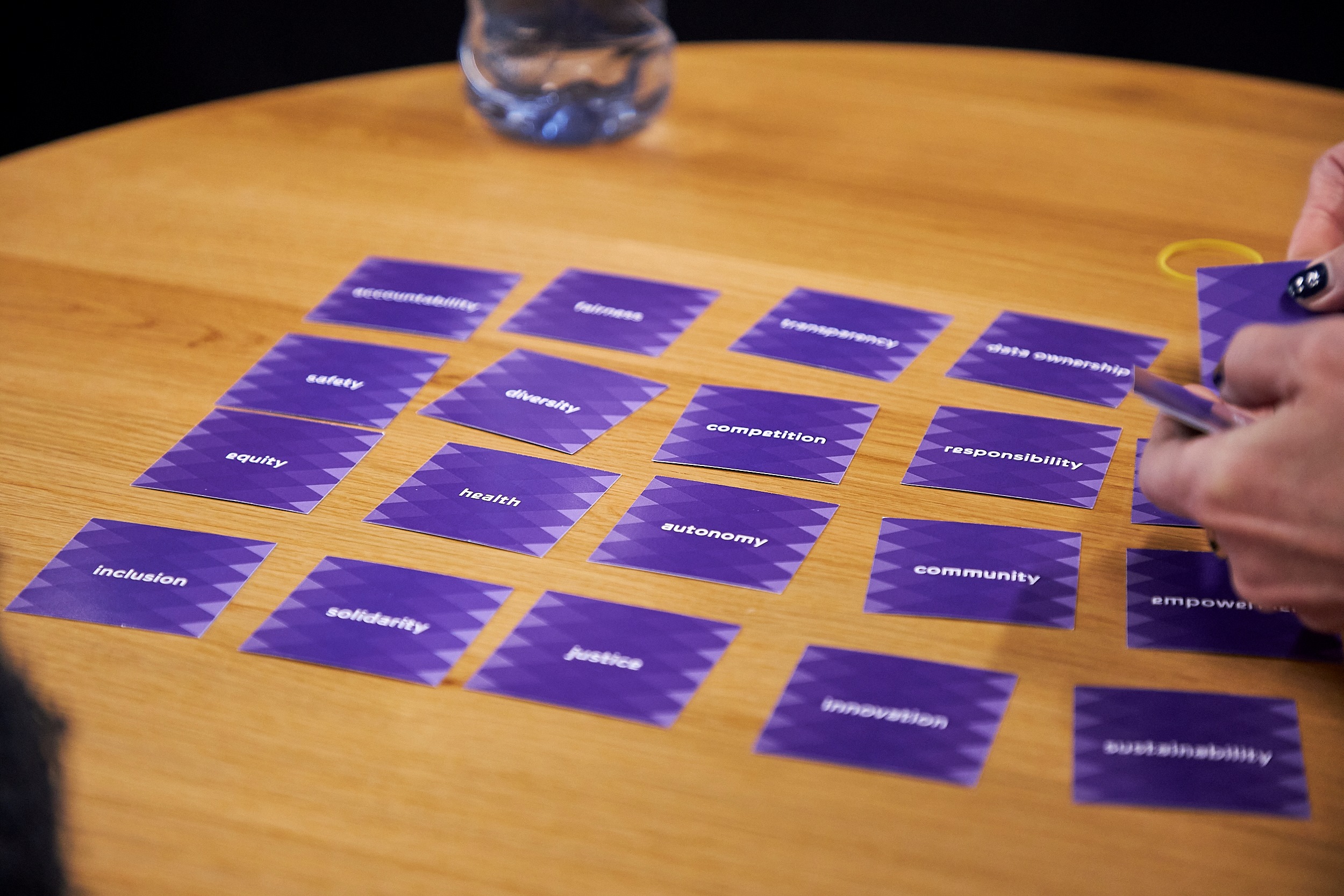
Results: Which values are important when sharing our energy data?
In smaller groups, the participants discussed which values they found important for an energy data common using a value card deck from Waag. Some values that were mentioned were:
- Trustworthiness: It is important to trust one another when sharing our energy data. It helps when we assume that everyone that is part of the common has the right intentions.
- Fun: The energy Data Commons should be fun and positive! The participants discussed gamification and rewards as part of the common.
- Knowledge: One of the goals of sharing data with each other is to gain more knowledge about energy consumption and saving.
- Justice and solidarity: If everyone in the common feels safe and acknowledged, it will benefit the outcome. Everyone in the common should be treated equally.
- Inclusion and Community-feeling: It is important that people feel involved in the project. The Data Commons should improve our lives, make it more sustainable but also progress our social relations.
During this Demoday, we got to know the Data Commons collective and experienced which values we find important when sharing our data with others. Amsterdam Economic Board will remain involved in the Data Commons Collective in a coordinating role and work on use cases to understand how data commons can work for society.
Would you like to know more about the Data Commons Collective or do you have any input for them? Please feel free to reach out to me via sophie@amsterdamsmartcity.com or leave a comment below.
Recap of Demoday #22
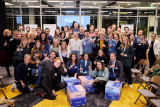
On Thursday December 14th, Amsterdam Smart City partners concluded 2023 with an afternoon full of inspiration, exchange and connections at our 22nd Demoday! Our partner Deloitte welcomed our network in The Garage, where their ‘Deloitte Studios’ department is located. In this article, we’ll give you a quick overview of the Knowledge Session, Work Sessions and Pitches. Interesting in learning more? Read the full reports by our Programme Managers Noor, Pelle and Sophie (linked below).
About our Demodays
The Demodays are one of the tools we use to stimulate innovation and encourage connection between our partners and community. The purpose of the Demodays is to present the progress of various innovation projects, ask for help, share dilemmas and involve more partners to take these projects to the next level. More information about the Demodays can be found here.
Knowledge Session: Change in the here and now, with Theory U
To kick-off our final Demoday of 2023, our brand-new partner Hieroo led an inspiring knowledge session about the change method they use for social innovation in the city: Theory U. Dorien Schneider and Maartje Krijnen taught us more about this methodology and how it can help us solve complex problems by shifting from ego to eco-thinking. Read the full report here.
Work sessions
After the plenary Knowledge Session we split up in different worksessions, each exploring regional innovation challenges. As always, we had set up the sessions’ topics and moderation in collaboration with our partners.
Mobility | Decision-making along the principles of Inclusive Prosperity – Jurhan Kwee (Municipality of Amsterdam)
In The Netherlands, the concept of ‘Inclusive Prosperity’ is on the rise. Policy makers are busy defining this concept, figuring out how to put this concept into practice and what it means for their decision-making process. Together with his colleagues at the Municipality of Amsterdam, Yurhan Kwee hosts sessions on decision-making along the principles of Inclusive Prosperity. With the input he gathers, he hopes to make the decisions needed for our Inclusive Prosperity ambitions more understandable and transparent, both for Amsterdam’s administrators and councillors as well as its citizens. Read Pelle’s recap article here.
Digital | Data Commons Collective: Using data for a liveable city – Lia Hsu (Amsterdam Economic Board) and Simone van der Burg (Waag)
In the big tech-dominated era, data has been commercially exploited for so long that it is now hard to imagine that data sharing might also benefit the community. Yet that is what a collective of businesses, governments, social institutions and residents in Amsterdam aim to do. Sharing more data to better care for the city. On behalf of the Data Commons Collective, Lia Hsu (Strategic Advisor at Amsterdam Economic Board) asked the Amsterdam Smart City network for input and feedback on their Data Commons initiative. Read Sophie's recap article here.
Energy | How can we continue to facilitate the homeowner in driving the energy transition? | Wouter van Rooijen (Alliander)
Wouter van Rooijen (Alliander) discussed the challenges related to grid congestion. From 2030 onwards, it is expected that a significant portion of the low-voltage network will experience both over- and under-voltage. While the network will be reinforced as quickly as possible, the lack of labour capacity is also prompting the consideration of alternative solutions.
The solution that emerged from Wouter's co-creation process was WijkWise. In this work session, Wouter aimed to validate the WijkWise concept and find parties that could contribute to its development and market implementation. Dave van Loon from Kennisland moderated the session. Read Noor’s recap article here.
Circular | Navigating eco-emotions: The impact of working in sustainability on your mental wellbeing| Marian Zandbergen (Hogeschool van Amsterdam)
This work session, led by Marian Zandbergen (CIRCOLLAB, HvA) and moderated by Mareille de Bloois (Royal HaskoningDHV), explored the challenges and opportunities associated with eco-emotions, both personally and within organizations. The key question addressed was: How can individuals and organisations constructively manage eco-emotions, and what implications does this have for organisations? Read Noor’s recap article here.
Pitches
To end this festive afternoon and the year 2023 as a whole, we invited project owners and -members to present their progress and next steps on topics brought in during our events and deep-dives throughout 2023. The following projects were presented. You can read more about these topics on their dedicated articles and project pages, linked below.
Local Energy Systems: Where we started, what we have achieved, and what are the next steps – Omar Shafqat (University of Applied Sciences Amsterdam)
Connecting the resource- and energy transition – Edwin Oskam (MRA)
ChatGPT and the government: Possibilities and impact on our work – Jeroen Silvis (Province of North Holland)
Floating urban districts: Future-proof living in the Metropolitan Region – Joke Dufourmont (AMS Institute)
Mobility Justice: Raising the topic of Mobility Poverty and the working group’s progress – Bas Gerbrandy (Province of North Holland)
Our next Demoday will take place in April. Do you have an inspiring story or project you want to pitch to the Amsterdam Smart City network? Let us know via sophie@amsterdamsmartcity.com
ICC Phase 2: Kick off in Brussels

The Intelligent Cities Challenge (ICC) is one of the European Commission’s largest city support initiatives supporting European cities in their green and digital transitions. ICC delivers knowledge and support services to cities and their local economies to address two major challenges: making the transition to a net-zero economic model, while enabling social inclusion and sustainable development for every EU citizen.
Cities learn how to address these challenges through Local Green Deals: integrated, multi-disciplinary action plans to lead the green and digital transition across sectors from the built environment, urban mobility and renewable energy systems to tourism or small retailers. Cities become members of a vibrant network, gain access to advisory services, innovation and sustainability management techniques, cutting-edge technology and training and get inspiration and advice from peers and mentor cities.
Building on the success of the previous edition of the ICC programme (2020-22) and Digital Cities Challenge (2017-19), the ICC will now enter Phase 2!
Amsterdam as a Mentor City
Like previous years, Amsterdam has been selected to join the support programme as a mentor city. The city will play a leading support role by guiding the 64 core cities as they embark on their two year journey to create impactful strategies and develop innovative solutions that will place the cities at the forefront of the green and digital twin transition through Local Green Deals. A nice compliment, allowing the Amsterdam Region to share their experiences and learnings from setting up Local Green Deal initiatives over the past years.
The Intelligent Cities Challenge Strategy City Lab: Accelerating the Twin Transition (November 2023)
On 23 and 24 November 2023, over 200 people - a mix of Intelligent Cities Challenge (ICC) core and mentor cities, political leaders and representatives from European institutions gathered for the first time in-person to discuss the status quo of Twin Transition. Through examples and best practices, attendees had the honour to hear from over 30 speakers as they shared insights into collaboration methods, Local Green Deals, climate ambitions, digital transitions and more across the course of 20 sessions.
Amsterdam Smart CIty's Leonie van den Beuken travelled to this gathering in Brussels as one of the representatives of the Amsterdam Region. She summarized her trip as follows:
This EU program helps cities from north to south, east and west to connect, share and learn. A much needed interaction, as we all try to improve the quality of life of our citizens. We all struggle with the ever rising cost of living. And we all want to get our cities to become more sustainable.
None of this comes easy, but we all know that local collaboration plays a key role. Building local coalitions between government, businesses and citizens is one thing, but how do we make sure these so called coalitions of the willing actually become coalitions of the doing?
Some of the learnings we shared from the Amsterdam Region are; the need for political support and the importance of trust and respect.
Local political leadership will inspire and guide society and entrepreneurs to invest and contribute. However, make sure pilotical support doesn’t evolve into political ownership. When that happens, societal parties and businesses tend to step out the coalition.
Take the importance of trust and respect seriously. You need to show long term commitment, take time to create understanding between parties. Take competition between participating SME’s serious and define together how to handle this together. Create a workflow in which smaller parties are allowed to participate less intense but sill feel incorporated.
We'll keep you up to date on our participation in future gatherings and results from ICC Phase 2. Want to know more? Check https://www.intelligentcitieschallenge.eu/
Demoday #20: ChatGPT and the Government: Opportunities and challenges
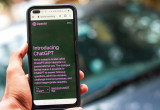
Are language processing tools powered by AI, such as ChatGPT, revolutionising the way we work and live together? How should governments, such as the province of North Holland, deal with this? What is the impact as the technology behind ChatGPT evolves and is used more and more prominently, outside and within their own organisations? Is it an efficient way to communicate with citizens, write policy documents, or answer state questions? Or should we avoid or discourage the use of ChatGPT for governments? During Demo Day #20, we explored the possibilities and potential impact of ChatGPT on the work of governments. We will discuss not only the technology itself, but especially the ethical aspects involved. How can officials be included in the responsible use of this technology?
Case & Set-up of the Session
After an introduction of the question by the Jeroen Silvis and Martijn Veerman from the province of North-Holland, the participants first identified opportunities and threats when using ChatGPT for a concrete case study: writing a housing vision for the region using ChatGPT. The opportunities and threats were identified from perspectives: political administrators, civil servants working for the province and municipality, citizens and housing developers and associations. After this round of identifying opportunities & threats, the participants discussed some important factors the province of North Holland should keep in mind when developing a framework for the use of ChatGPT.
Insights
Opportunities for political administrators, civil servants working for the province and municipality, citizens and housing developers:
Make civil service more efficient and effective; compose and read policy documents;
Civil servants working for the province can save a lot of time as ChatGPT makes it easier to write large policy document; it can also serve as a source for creativity and inspiration;
ChatGPT could be beneficial for civil servants working for municipalities, as ChatGPT might help simplify complicated documents;
Citizens benefit as complicated plans become more readable and accessible through the use of ChatGPT;
ChatGPT could help broaden visions for area development and housing (in this specific case) which is beneficial to housing developers.
Threats for political administrators, civil servants working for the province and municipality, citizens and housing developers:
Through using ChatGPT, internal and privacy-sensitive information will be in hands of big tech multinationals, which is a big risk for political administrators; dependence on AI might lead to a loss of autonomy;
Using ChatGPT for writing policies might lead to tunnel vision for civil servants working for the province; Does the policy fully reflect the vision of the civil servant when using ChatGPT?;
ChatGPT makes use of existing content, which may lead to less innovation. This is a risk for civil servants working for the municipality as they have to execute the policy;
Citizens might worry about their privacy, as ChatGPT is owned by a big tech multinational;
ChatGPT might simplify housing visions whilst the realisation of housing is a complex issue, this is a threat for housing developers.
After identifying the opportunities & threats, the participants discussed what the province of North Holland should keep in mind for the development of a ChatGPT framework for internal use. Some remarks from the group:
Always remain critical and check everything, make sure to identify your sources;
Pay attention to public values and explore open-source language model alternatives that are more responsible and open source. Be aware of the influence of big tech;
Provide clear frameworks and instructions for the use of ChatGPT or a similar tool;
Make clear rules about who is responsible;
Knowledge and experience is also within people, not everything is public or published and thus accessible for ChatGPT;
Learn to ask the right questions: what is the input for ChatGPT? Educate your colleagues about the use, the do’s and don’ts;
Hire ChatGPT expert(s) and organise internal strategy sessions;
Be transparent about the use of ChatGPT within the government;
Choose for one tool, preferably open-source, that can be used organisation-wide.
Conclusion and Next Steps?
It is clear that the technology around AI powered language models is developing very quickly. As colleagues of the province of North Holland are already using ChatGPT, it is important to develop a framework for internal use. Jeroen and Martijn from the province of North Holland will use the concrete input from this session and work on plan/framework the coming months. It is unclear whether this question will have next step within the Amsterdam Smart City network, but a valuable connection has been made between the University of Applied Sciences of Amsterdam and the province of North Holland. Do you have any input for Jeroen and Martijn about this topic? Please contact me via sophie@amsterdamsmartcity.com, or leave a comment below.
3 Ways to learn more about Amsterdam Smart City

Do you want to connect, learn, and exchange experiences about Amsterdam Smart City? We have designed programs to help you connect to Amsterdam’s innovation ecosystem and key learnings from projects in the Amsterdam metropolitan region. Here are our most popular programs:
Smart City the Amsterdam Way
We give you an overview of Amsterdam Smart City’s program, governance and key projects. It’s a light way to get introduced to it all in 1,5 hours and we can also offer this online.
Timing & cost: 1.5h hours, from €400 per groupAmsterdam Smart City Deep Dives
Go on a Deep Dive with Amsterdam Smart City and get to the bottom of the energy, mobility, digital city or circular economy transition during this customized 2,5 hour session with multiple experts from Amsterdam’s ecosystem.
Timing & cost: 2.5 hours, from €600 per groupSmart City Experience
Since 2016, Amsterdam Smart City has hosted more than 300 customized study programs, innovation journeys and trade missions from over 30 countries. With the Smart City Experience we offer tailor-made programs consisting of expert meetings and project visits connecting local and (inter)national stakeholders to the Amsterdam Smart City approach and innovation ecosystem. To request a Smart City Experience, send a request at least one month in advance to cornelia@amsterdamsmartcity.com.
Timing & cost: 6-8 hours, from €1,500 per group
Where do the Amsterdam Smart City Programs take place?
Most programs take place, or at least start at, the Smart City Lab on the Marineterrein Innovation District. This is a "small space for big ideas" where we showcase examples of smart city solutions from Amsterdam. The Smart City Experience Lab is also a workplace where Amsterdam Smart City partners meet and collaborate. Groups visiting the Experience Lab can also visit the Marineterrein Amsterdam Living Lab on their own or as a part of an organized program.
Data Dilemmas: Mobility Data Top 15 Challenge
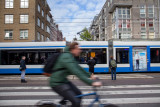
Learn more about the 15 types of data needed for the digitalization of the mobility sector, and the challenges involved
In 2018, the national government made an agreement to contribute to the digitalization of the mobility sector, thereby supporting the sustainability and the mobility transitions. The target is to have 90% of the public data structurally in order by 2023 and to be able to offer it as open data. In this process, a “Data Top 15” were identified – that is 15 types of data that are needed to further digitize Dutch infrastructure, including parking data, logistics data, and bicycle data.
But collecting and managing these 15 data items is a time-consuming and onerous process which exposes many “data dilemmas”. During this session, we will dive into some of these dilemmas and lessons learned from the development of Data Top 15 in the Amsterdam Region. What barriers have already been overcome, and what is the roadmap for the upcoming years?
Agenda
15:15 – 15:30 Walk-in
15:30 – 15:40 Welcome and introduction by Amsterdam Smart City
15:40 – 16:00 Data Top 15 approach and lessons learned by Tijmen van Heukelingen (municipality of Amsterdam/Regionaal Data Team)
16:00 – 16:10 Reflection by Indranil Bhattacharya (Co-founder and Digital Society Director at Townmaking Institute)
16:10 – 16:30 Feedback and discussion
16:30 – 17:00 Wrap-up and networking drinks
About the Data Dilemma series
Data Dilemmas is a collaboration between Amsterdam Smart City and the City of Amsterdam’s Data Lab. Three times a year we explore the possibilities for using data and new technologies to address urban and societal challenges, with a focus on responsible digitalization. The goal is to use data to make cities more safe, clean and accessible. But what happens to all the data that is collected? Which dilemmas do we encounter when we collect (personal) data to improve the city? These questions are important for everyone: governments, knowledge institutions, companies, and civil society. Amsterdam Smart City would like to explore with you which decisions are needed for responsible use of data.
Location
This Data Dilemma's event will take place at Pakhuis de Zwijger, Amsterdam.
Programma voor Demodag #20 – Energie, Circulair, Mobiliteit en Digitaal
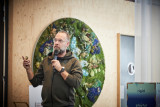
Op dinsdag 16 mei organiseert Amsterdam Smart City een Demodag rondom onze vier transitiethema’s: energie, circulair, mobiliteit en digitaal. Er staan weer veel mooie initiatieven en vraagstukken op het programma die we met ons netwerk gaan verdiepen en verrijken. De Demodag vindt plaats bij A Lab. De thuisbasis voor een community van maatschappelijk betrokken organisaties, waaronder onze partner Cenex.
Demodagen zijn onderdeel van ons innovatieproces en bedoeld om de voortgang van verschillende innovatieprojecten te stimuleren, hulpvragen op tafel te leggen, dilemma's te delen en anderen te betrekken bij projecten of uitdagingen. Dit gebeurt in de vorm van zogenaamde ‘pitches’, met een korte hulpvraag aan de hele groep, en in werksessies waarin we een aantal vragen met een kleine groep wat grondiger behandelen. Meer informatie over wat de demodagen precies zijn en waarom je mee wilt doen, vind je hier.
Klinkt het programma interessant? Je bent welkom om aan te sluiten. Laat het ons weten in de comments of mail naar info@amsterdamsmartcity.com. De Demodag is van 14:00-16:30 met een borrel na afloop.
PITCHES
Samen werken aan een groener en gezonder Nederland – Pientere Tuinen
Pientere Tuinen heeft tot doel een groenere, gezondere leefomgeving te creëren door het bewustzijn en de motivatie bij tuinbezitters te vergroten. Pientere Tuinen is een 3-jarig project waarin 7 partijen samenwerken. De unieke aanpak van Pientere Tuinen draait om drie samenhangende onderdelen: 1) Er wordt data verzameld met een slimme sensor, 2) er wordt kwantitatief en kwalitatief onderzoek gedaan naar strategieën voor een gezonde, groene leefomgeving en blijvende gedragsverandering, en 3) er wordt advies op maat gegeven aan bewoners over de inrichting en het beheer van hun tuin en te komen (obv de data en onderzoeken). Pientere Tuinen combineert technologie/data, participatie en sociale innovatie.
PublicSpaces Conferentie – PublicSpaces
Hoe bouwen we aan een internet dat werkt voor iedereen? Een online ruimte die onze gezondheid, vrijheid en bestaansmiddelen dient en niet in de houdgreep is van Big Tech? Op 27 en 28 juni organiseren PublicSpaces en Waag Futurelab de PublicSpaces conferentie met als thema: een collectief internet. In deze pitch vertellen ze meer over het inspirerende programma vol panels, keynotes, kunst, geestverruimende cultuur en meer!
Innovatie Paviljoen Marineterrein – Gemeente Amsterdam
In het toekomstige Innovatie Paviljoen op het Marineterrein gaan verschillende pilots voor duurzame innovaties plaatsvinden. Zo worden pionierende MKB’ers ondersteund en onderzoekt de gemeente welke verandering in werkwijzen en culturen er nodig is om deze innovaties op grotere schaal door te kunnen voeren. Marlies Veld neemt jullie in haar pitch mee in de plannen voor het paviljoen.
Worden alle tankstations straks laadstations? – Over Morgen
Over Morgen ontwikkelt momenteel een ‘Tankstation Transitie Plan’. In een korte maar prikkelende pitch vertellen ze meer over dit project en de vraag; worden alle tankstations straks laadstations? Want zijn traditionele stations nog wel relevant als we in de toekomst op elke hoek van de straat kunnen laden? Hoe kan de locatie de transitie naar duurzaam transport versnellen? En hoe ziet het laadstation van de toekomst er precies uit?
WERKSESSIES
Digitaal | ChatGPT en de overheid: mogelijkheden en impact op ons werk – Jeroen Silvis en Martijn Veerman, Provincie Noord-Holland
Zorgt de techniek van ChatGPT voor een revolutie in de manier waarop we werken en samenleven? Hoe zouden overheden, zoals de provincie Noord-Holland, hiermee om moeten gaan? Wat is de impact als de techniek achter ChatGPT zich doorontwikkeld en steeds prominenter wordt gebruikt, buiten en binnen de eigen organisatie? Is het een efficiënte manier om met burgers te communiceren, beleidstukken te schrijven, of statenvragen te beantwoorden? Of zouden we onze vingers er helemaal niet aan moeten branden? Tijdens deze Demodag zullen we dieper ingaan op de mogelijkheden en potentiële impact van ChatGPT op het werk van overheden. We bespreken niet alleen de technologie zelf, maar met name ook de ethische aspecten die hierbij komen kijken. Hoe kunnen ambtenaren meegenomen in het verantwoord gebruik van deze technologie?
Energie | (English session) Local smart energy systems and P2P trading governed by citizen’s energy communities; moving from research and innovation projects to replication and upscaling – Danijela Šijačić en Mark van Wees, HvA
To mitigate climate changes and reduce CO2 emissions and in accordance with different European initiatives like renewable energy directive (RED), Clean Energy Package, and climate-neutral and smart cities mission, transition of energy system to a more sustainable and decentralized one is needed. In Amsterdam, the Buiksloterham demonstration project from ATELIER is paving the way for this transition. It is an innovation R&D project where local smart energy system and P2P trading governed by citizen’s energy coop is implemented. The ambition from ATELIER/HvA is to research how to upscale and replicate that Positive Energy District (PED). HvA invites the Amsterdam Smart City network to help prepare this upscaling (in Amsterdam) by discussing the technical, economic and social perspectives
Mobiliteit | (English session) Urban Air Mobility: order in the airspace & opportunities for an inclusive mobility system – Kerry Rohrmeier (San Jose University) in collaboration with Amsterdam Smart City partners
For this worksession, our international guest Kerry Rohrmeier will discuss the future of Urban Air Mobility with the Amsterdam Smart City network. Together with some of our partners Kerry will discuss this futuristic concept and its considerations. The group will dive into matters like maintaining order in the airspace among times of areal innovations, and how urban air mobility could contribute to a more inclusive mobility system.
Circulair | Plastic: We’re loving it! Van plasticverslaving naar trendbreuk – Marten Boels, MRA
De wereldwijde hoeveelheid plastic is sinds 2000 verdubbeld. We are loving it! Het is tegelijk ook echt een probleem van onze generatie. Daarvoor kunnen we niemand de schuld geven, maar onszelf. En steeds meer bewijs wijst op de gevaren van microplastics: in het milieu, in dieren en ook in onszelf. Het is kortom hoog tijd voor een trendbreuk in het plasticgebruik. Doel van de sessie is om kennis uit te wisselen en over oplossingsrichtingen te sparren. De partners in de Metropoolregio Amsterdam (MRA) komen graag te spreken over oplossingsrichtingen.
Today’s Changemakers #1, Romy Dekker: Using Digital Technologies in The Energy Transition
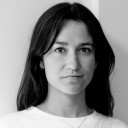
In Today’s Changemakers, we talk with pioneers in our network who are all, in their own way, shaping the city and region of the future. Our first interviewee is Romy Dekker, senior researcher at the Rathenau Instituut. She studied Cultural Anthropology and Development Sociology at Leiden University, where she quickly learned that our societal drive for growth comes at the expense of our planet, and that development does not always mean improvement for all. This insight motivated Romy to combine her interest in science with sustainability. Currently, she works as a senior researcher on topics at the intersection of sustainability, digitalisation and democracy. Her latest work caught our attention. She just started a study on how new technologies, such as Digital Twins, can contribute to tackle societal challenges in the built environment. The following paragraphs describe our insightful conversation about the complexities when using digital technology, her first learnings, and personal ambitions.
In Romy's work, she looks at the role of data and digitalisation in the energy transition in two ways. The first is data as an enabler for a just energy transition.
“The convergence of sustainability transitions and the digitisation of society represents two of the most defining trends of our era. The intersection of these trends has a significant impact on society. The Rathenau Instituut wants to provide tools for a broad discussion about what is needed to use digital technology and data for just sustainability transitions.”
“In our report Stroom van Data, we investigated how data can be used for a just energy transition. It's becoming increasingly clear that data are indispensable for the energy transition. Data can help with keeping the energy system affordable, reliable and clean, for example by better aligning the demand for and supply of energy and by providing citizens insights into their energy behaviour. However, there are also genuine concerns about citizens' control over their data, the cybersecurity of the energy supply, the environmental impact of digital technologies and the distribution of benefits and burdens of a digitalized energy-market. Addressing these issues is necessary to achieve a socially responsible energy transition.”
The second approach concerns how digital technologies, specifically Digital Twins* (definition can be found at the end of this page), can contribute to decision-making regarding spatial planning for sustainability challenges, such as the energy transition. Are Digital Twins merely a hype or a hope?
“Urgent societal challenges are often interdependent, meaning that an intervention in one area can have an impact on another; a decision to build a house somewhere, for example, has an impact on achieving other urgent energy, water, and climate goals. To tackle this complexity and improve the information available to stakeholders, public and private parties turn to data and digital technologies, and more specifically to Digital Twins.”
“However, as digital technologies and data are neither neutral nor apolitical, it is important to remain critical on how Digital Twins can contribute to tackling societal problems. The use of Digital Twins in decision-making and governance may influence our definition and understanding of problems. Consequently, it may determine what is governed, who has the ability to exercise power and be involved, and how we act. Ultimately, this can determine if social challenges are genuinely and fairly addressed. When simulating an urban region, there are also many ecological, social and political-economic aspects. How do you take these factors, which cannot easily be measured, into account?”
“Because the Digital Twin is gaining popularity as a tool for decision-making, the Rathenau Instituut will investigate how such technologies can contribute to tackling societal challenges in the built environment. Can Digital Twins help to make more integral decisions and engage citizens and other relevant stakeholders in decision-making? And if so, how? What are risks associated with using these technologies and how can they be mitigated?”
Romy’s considerations for the Amsterdam Smart City community
“A bit of an open door, but nonetheless very important; technology is a means and not an end in itself. It is important that its use takes place in a responsible manner, with an eye on public values such as equality, fairness, and democratic governance and that it is carefully considered how its use contributes to the urgent societal challenges we face. Finally, public involvement in sustainability transitions is important, but only if it takes place in a meaningful way. Otherwise, it can do more harm than good. This requires a clear answer to questions such as: is it clear what the purpose and process of public participation are and what will be done with the input?”
Using science to tackle societal challenges
“I used to doubt whether I wanted to work as a scientist or not. Because although scientists do very important work, they can sometimes be a bit disconnected from concrete societal issues, causing their work to lose relevance. I like how at the Rathenau Instituut, we really stand between science, politics and society. We want to make scientific insights accessible to a wider audience, and also actively involve citizens through participatory methods. It motivates me that in my work, I’m increasingly looking at how science, technology and innovation can contribute to tackling major societal challenges in a just way.”
“My dream for the urban region of the future? A liveable city for both humans and non-humans that operates within planetary boundaries and ensures an equitable distribution of both burdens and benefits.”
Romy and her colleagues recently started their research on using digital technologies, including Digital Twins, to address societal challenges that come together in a specific (urban or regional) area. Are you currently working on a Digital Twin project, or as a policymaker interested in the use of Digital Twins but facing certain challenges? And would you like to contribute to Romy’s research? Shoot our community manager Sophie (sophie@amsterdamsmartcity.com) a message and she will connect you with Romy!
*A digital twin (DT) can be seen as a virtual representation of a physical product, process or (eco)system. They can be used to simulate how a physical object or system will perform under different conditions and scenarios, allowing for a better understanding and optimization of processes.
Programma voor Demodag #19 – Energie, Circulair, Mobiliteit en Digitaal
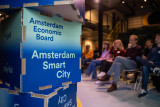
Op donderdag 23 maart organiseert Amsterdam Smart City een Demodag rondom onze vier transitiethema’s: energie, circulair, mobiliteit en digitaal. Er staan weer veel mooie initiatieven en vraagstukken op het programma die we met ons netwerk gaan verdiepen en verrijken. De Demodag vindt plaats bij DB55, een inspirerende locatie in de Amsterdam Houthavens waar innovatie, onderwijs, sport, gezondheid en kunst samenkomen.
Demodagen zijn onderdeel van ons innovatieproces en bedoeld om de voortgang van verschillende innovatieprojecten te stimuleren, hulpvragen op tafel te leggen, dilemma's te delen en anderen te betrekken bij projecten of uitdagingen. Dit gebeurt in de vorm van zogenaamde ‘pitches’, met een korte hulpvraag aan de hele groep, en in werksessies waarin we een aantal vragen met een kleine groep wat grondiger behandelen. Meer informatie over wat de demodagen precies zijn en waarom je mee wilt doen, vind je hier.
Klinkt het programma interessant? Je bent welkom om aan te sluiten. Laat het ons weten in de comments of mail naar info@amsterdamsmartcity.com. De Demodag is van 14:00-16:30 met een borrel na afloop.
Pitches
Bewustwordingsmatrix - Susan van Esch en Bas Schilder (phbm)
In deze pitch voegen we een gereedschap toe aan jouw Toolbox voor Smart City-vraagstukken; het BewustwordingsModel. Dit model maakt de positie en wensen van jou en de ander expliciet en voorkomt dat er ruis ontstaat over het niveau van ‘slimheid’ in de leefomgeving. Hoe slim is de ideale leefomgeving wat jou betreft, nu en in de toekomst? Wat betekent dat voor o.a. je strategie, diensten en technologie?
FIXbrigade – Bas Ruis (FIXbrigade Amsterdam)
De FIXbrigade is een leer-werktraject en helpt mensen met een krappe beurs om hun huis beter te isoleren. Daarvoor geven ze praktische tips én voeren ze de benodigde isolerende maatregelen uit. Bas vertelt in zijn pitch meer over het leer-werktraject, de behaalde resultaten tot nu toe en de toekomstplannen van de FIXbrigade.
CIRCOLLAB - Yanti Slaats (Hogeschool van Amsterdam)
CIRCOLLAB is een consortium van 33 partners, gericht op het identificeren welke technologische, sociale, economische en creatieve innovaties er in de Metropool Regio Amsterdam (MRA) nodig zijn om veranderingen in een stroomversnelling te brengen en hoe deze met interdisciplinair praktijkgericht onderzoek te realiseren zijn. Yanti vertelt ons meer over deze samenwerking.
Urban Benchmark methodology – Mariana Garcia Espindola (World Benchmarking Alliance)
(Pitch in English) The World Benchmarking Alliance will translate SDG-11 and The New Urban Agenda into a roadmap for the private sector, outlining the clear commitments that companies must make to help transform our urban system. This will open the door for innovative initiatives to ignite and spread, so that the cities of our future are cities that work for everyone. Mariana introduces the Urban Benchmark methodology and invites Amsterdam Smart City partners and network to contribute to its development.
Werksessies
Digitaal | CommuniCity – Neeltje Pavicic (gemeente Amsterdam)
De gemeente Amsterdam wil dat iedereen kan profiteren van de kansen en mogelijkheden van digitalisering. Binnen het CommuniCity project worden in de komende drie jaar door heel Europa honderd pilots uitgevoerd om technologische oplossingen te ontwikkelen voor en met kwetsbare gemeenschappen. Hoe zorgen we ervoor dat de behoeften en uitdagingen van deze doelgroepen beter in beeld zijn? En hoe koppelen we toepassingen die tech bedrijven hiervoor hebben aan maatschappelijke organisaties die een digitale oplossing zoeken? Gemeente Amsterdam onderzoekt hoe we de behoeften van kwetsbare gemeenschappen beter kunnen matchen aan tech partijen en hun oplossingen. We nodigen het Smart City netwerk uit om de huidige knelpunten samen met ons te onderzoeken, de rol van de gemeente te verkennen, en oplossingen te bedenken. Denk je met ons mee?
Mobiliteit | Mobility as a Commons – Jop Pék (gemeente Amsterdam)
Wil de stad haar ambities halen op het gebied van autoluw én sociaal blijven dan zal er iets moeten veranderen. Coöperatieve deelmobiliteit of Mobility as a Commons (MaaC), waarbij voertuigen in beheer en bezit zijn van Amsterdammers, kan kansen bieden voor bewoners en de stad. De gemeente Amsterdam vertelt jullie graag meer over het concept, de aanpak van het project en hoe de Europese samenwerking tot stand is gekomen. Ook willen zij graag met jullie reflecteren op het project, wat er nodig is voor een paradigmashift binnen de mobiliteitssector en andere projecten die relevant zijn.
Energie | Impact in kaart brengen van 15% GasTerug – Laetitia Stuijt (Amsterdam Economic Board)
Vanuit het Actienetwerk 15% GasTerug wordt sinds het uitbreken van de oorlog in Oekraïne gewerkt aan het structureel versnellen van energiebesparing. In januari is het doel van 15%GasTerug gehaald, maar wat betekent dat precies? Welke impact hoort daarbij en op welke niveaus? Hoe haal je de benodigde data op uit data-blind-spots? En hoe vertaal je de impact naar een helder verhaal? Voor de voortzetting van 15%GasTerug is het van belang dat de resultaten goed in kaart worden gebracht. Actienetwerk 15%GasTerug wil daar graag over in gesprek met het netwerk tijdens deze werksessie.
Circulair | CircuLaw – Romy Snijders, Yvonne de Meij van Streefkerk en Arjan Hassing (gemeente Amsterdam)
De circulaire transitie schiet nog niet erg op. Als we doorgaan zoals we nu bezig zijn, worden de 2030 halveringsdoelstellingen voor materiaal nooit gehaald. Meer ‘drang en dwang’ is nodig, maar slechts 1% van de beleidsinstrumenten van decentrale overheden is van dwingend van karakter. CircuLaw wil hier verbetering in brengen, door juridische instrumenten aan te bieden en beleidsmakers, projectleiders en inkopers te helpen bij de toepassing ervan. Graag halen zij perspectieven vanuit de markt, overheid en kennisinstellingen op om CircuLaw verder te ontwikkelen. Hierbij ligt de focus op: wat is precies een goede manier om regelgeving toe te passen?
Foto door Dieuwertje van der Stoep / Meisje met de camera
Amsterdam Smart City partners aan de slag met drie urgente maatschappelijke challenges
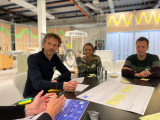
Hoe zet je de mens centraal in digitalisering? Hoe voorkom je uitsluiting van mensen die vervoer niet meer kunnen betalen? Hoe ontwikkel je samen lokale energiesystemen? Amsterdam Smart City werkt met 27 partners in co-creatie aan deze drie belangrijke vraagstukken.
Van digivaardige mensen naar mensvaardige digitalisering
Technologische en innovatieve ontwikkelingen volgen elkaar steeds sneller op. Als overheid wil en moet je hierin meegaan. Tegelijk leidt de inzet van digitalisering en data vaak tot ongewenste resultaten, wat de afstand tussen inwoners/ondernemers en de overheid vergroot.
Gemeente Haarlemmermeer verschuift haar focus van ‘het systeem staat centraal, mensen moeten maar digivaardig worden’ naar ‘de mens staat centraal, onze systemen moeten mensvaardig worden’. De onderliggende vraag is hoe zet je de mens écht centraal in digitalisering en het vormgeven van digitale systemen? De gemeente Haarlemmermeer zou graag samen optrekken om deze vragen uit te werken tot een advies dat breder inzetbaar is.
Mobiliteitsarmoede: hoe voorkomen we uitsluiting van mensen in het mobiliteitssysteem?
Stijgende benzine- en elektriciteitsprijzen; de toenemende digitalisering en afname van het openbaar vervoeraanbod zorgen er, onder andere, voor dat steeds meer mensen problemen hebben om zich te verplaatsen. Verduurzaming en deelmobiliteit lijken niet voor iedereen weggelegd en maatregelen om dit te stimuleren werken het probleem mogelijk zelfs in de hand. Het risico op sociale uitsluiting wordt hierdoor groter.
De provincie Noord-Holland en DRIFT maken zich zorgen over mobiliteitsarmoede en vragen zich af wat we eraan kunnen doen om deze mensen mobiel te houden. Er is echter nog weinig bekend over de omvang van het probleem, de exacte doelgroepen en welk instrumentarium werkt (en wat vooral niet). Daarom willen we graag in gesprek met de partners om tot gezamenlijk inzicht en een afgestemde aanpak te komen.
Samenwerking voor ontwikkeling lokale energiesystemen
De milieuproblematiek en de huidige hoge energieprijzen zorgen voor een snelle omschakeling van gas naar elektriciteit. Dat is de afgelopen jaren veel sneller gegaan dan voorzien, met netcongestie als gevolg.
Door samenwerking tussen lokale partijen kan er een zo optimaal mogelijk energiesysteem gecreëerd worden. Dat kan het elektriciteitsnetwerk ontlasten en, bijvoorbeeld, het maximaal gebruik maken van duurzame bronnen stimuleren en de energiekosten drukken.
Dit vraagt een intensieve samenwerking waarbij elke partij wordt uitgedaagd om verder te denken dan de eigen belangen. Er zijn geen bestaande structuren of systemen waar dit binnen past. Alliander doet een oproep voor samenwerking op dit vraagstuk.
Sinds november werken we in verschillende werkgroepsessies toe naar nieuwe initiatieven om antwoorden te bieden op deze uitdagende kwesties. Wil je ook meedenken en deel uitmaken van oplossingen? Neem contact op met Sophie via sophie@amsterdamsmartcity.com.
Data Dilemma’s Recap: Fair data sharing with Amsterdam Data Exchange (AMdEX)
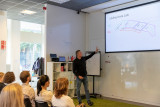
Data Dilemmas is a collaboration between Amsterdam Smart City and the City of Amsterdam’s Data Lab. During Data Dilemmas, we explore the possibilities for using data and new technologies to address urban and societal challenges, with a focus on responsible digitalization. The goal is to use data to make cities more safe, clean and accessible. But what happens to all the data that is collected? Which dilemmas do we encounter when we collect (personal) data to improve the city? These questions are important for everyone: governments, knowledge institutions, companies, and civil society. In the latest edition of Data Dilemmas, hosted on the 29th of September 2022, we invited Joep Meindertsma, Tom van Arman and Jan van Boesschoeten to take us through the experiences, dilemmas and lessons learned from the Amsterdam Data Exchange (AMdEX) initiative. Marit Hoefsloot from Waag gave a critical reflection on the presented Data Dilemmas.
Joep Meindertsma (Dexes) – Introduction to AMdEX
AMdEX is a collaboration between the Amsterdam Economic Board, AMS-IX, Dexes, the University of Amsterdam and Surf. AMdEX aims to give people more control over their data through a secure, trusted and neutral infrastructure which enables sharing data under specific conditions. AMdEX has two missions: give people more control over their data and make it more attractive to share data. These two missions are a data dilemma in itself.
Data exchange is currently monopolized by a handful of major players and the web is more centralized than ever before. The direct connections between people and organisations have become fewer. This is because we’re increasingly using middle-men, services between the data source and the user. Joep explains: “If you want to see someone’s vacation photos, you have to send a request to Facebook. Facebook owns the data, decides who can access it and dictates what the app looks like”. This problem is not limited to vacation photos or Facebook. It is about all our data. Almost all services are middle-men, with its own closed way of data sharing. This creates data silos – places where data is effectively locked away.
Joep refers to three types of data: “data we want to share, data we don’t want to share, and data we might want to share.” This ‘might share’ category often contains valuable data, but it can be costly or difficult to share. Set conditions makes sharing this data easier. AMdEX makes this possible through a few software projects they’re currently building: eFlint (a new language to describe legal constructs), DexPod (an open source personal data server) and Atomic Data (a specification and open source software to improve data interoperability).
Tom van Arman (Tapp) - AMdEX case study: Marineterrein Sensor Data
Meanwhile, the Marineterrein in Amsterdam is full of sensors, collecting all kinds of data. Think of MicroLAN measuring the water quality, or Public Eye collecting crowd data. Marineterrein is a ‘living lab’, where technologies that contribute to a sustainable and future-proof city can be tested. Together with AMdEX, Tom looked at how the collected data can be made accessible to third parties, such as researchers, journalists, students, artists and entrepreneurs. The Marineterrein and the data collectors, for example Public Eye, set conditions for the data to be used. Tom describes how this works in practice: “If a journalist is interested in using crowd data collected by Public Eye, they must be a member of the Marineterrein community and subscribed to AMdEX. If the journalists meets these requirements, they will receive an AMdEX email with a data download link.”
Jan van Boesschoeten (AMS-IX) - The Future of AMdEX
As Joep and Tom already mentioned, there are many questions around data: who owns the data, what are you allowed to do with it? How do you work together with your competitors to get more value out of your data? A data exchange can be a solution to these questions. This is why AMS-IX, a neutral member-based association that operates multiple interconnection platforms, is connected to AMdEX. Jan shortly describes the future of the AMdEX initiative. The field lab with use cases ends in June 2023, and at that time AMdEX also aims to be a legal entity. Additionally, one of their use cases involving KLM will be presented at AMS-IX’s MORE-IP community event in June. After that, AMdEX will onboard new use cases.
Marit Hoefsloot (Waag) – A critical reflection on the Dilemmas encountered in AMdEX
Last but not least, Marit Hoefsloot from Waag reflects on the dilemma’s presented by Joep, Tom and Jan. Marit describes that the use of data is often seen as an act of notion, whilst privacy is more of a passive notion (not using the data at all). However, it’s possible to use data whilst also protecting ones privacy. A good example of this is IRMA, a privacy-friendly digital wallet which can be used for authentication. As Marit pleads: “Data usage and privacy are not necessarily contradictory, it is about both.” Organisations should see protecting privacy as their own responsibility, instead of giving the illusion of consent with an opt-in or opt-out option.
The second dilemma Marit reflects on is about developer productivity vs. standardisation. Standardisation takes a lot of time, which takes away from innovation and productivity. However, you need standardisation to develop these kind of exchange platforms, as there are many organisations that are involved. Marit describes that the real questions we should talk about are: what is the flexibility of the standard? Do we create the standard together, or more top-down through legislation? Who are we standardizing for? “We should prioritise standardisation, but do it in an open and inclusive way.”
Would you like to join our next Data Dilemmas at Datalab? The upcoming session is scheduled on the 8th of December (topic and speakers to be announced). Keep an eye out on our platform for the programme!
Photography: Myrthe Polman
Hoe kan 5G bijdragen aan de verduurzaming van steden, growing green cities?

We brengen de Smart City Expo World Congress Barcelona naar je keukentafel!
BTG, gemeente Almere en Amsterdam Smart City nodigen je uit voor dit MRA evenement.
In een slimme stad zijn traditionele netwerken en diensten meer flexibel, efficiënt en duurzaam. Digitale informatie en telecomtechnologie laten de stad beter werken ten gunste van haar inwoners. Slimme steden zijn groener, veiliger en vriendelijker.
In de groeiende groene stad groeit innovatie mee om er voor te zorgen dat ze de wensen en behoeften van haar bewoners kan vervullen en voorspellen en kan verduurzamen. Dit heeft betrekking op mobiliteit, energie, circulariteit, infrastructuur, gezondheid en technologie.
Slimmere producten, diensten en een groter gebruik van data, sensoren en IoT stellen hogere eisen aan onze infrastructuur. Wifi 6, 5G en een fijnmaziger glasvezel netwerk met hogere snelheden zijn nodig. In dit webinar staan verschillende pilots op gebied van IoT en 5G centraal in de context van Floriade Expo 2022.
Programma 18 november
09.00 uur - Opening en welkom door Danny Frietman, Petra Claessen (BTG/TGG) en Leonie van den Beuken (ASC)
09.15 uur - Keynote Agentschap Telecom over antennes in steden
09.45 uur - Lenneke de Voogd over pilots Do IoT Fieldlab
10.15 uur - Keynote Serge Hollander, Floriade Expo 2022
10.35 uur - Gesprek aan tafel en samenvatting
11.00 uur - Afsluiting
De mindset voor een menselijke slimme stad

Met dit evenement brengen Amsterdam Smart City, BTG en de Gemeente Almere de Smart City Expo Barcelona naar je keukentafel!
Dat technologie kan helpen om de stad duurzamer en beter te maken, is niet nieuw. Het is de gedachte achter het concept ‘Smart City’ en de Smart City Expo World Congress in Barcelona die deze maand plaats zou vinden. Maar niemand wil in een Smart City wonen die zich alleen richt op technologie. Natuurlijk wel in een veilige, groene en bruisende stad.
Hoe creëren we die duurzame en leefbare steden? Hoe kan technologie hierin een nuttig middel zijn? Hoe zetten we mensen centraal in deze steden en nemen we hun waarden mee in de ontwikkeling?
Klaas van Egmond, hoogleraar Geowetenschappen, neemt ons mee in een inspirerend verhaal over de tijdsgeest en de mindset die nodig is om uitdagingen in steden aan te gaan. Vervolgens gaan we in gesprek. Hoe pas je deze mindset toe in je werk? Zie je partijen bij wie dit al goed lukt of juist niet? Daarna is er een roadshow met start-ups die betere straten, buurten en steden realiseren, met behulp van technologie. En als deelnemer kun je hen ook weer een stap verder helpen.
Als kers op de taart hebben we iets heel speciaals op de planning staan.. Hét online platform waar jij dagelijks online inspiratie en kennis haalt is volledig vernieuwd. Dit zullen we gezamenlijk en feestelijk met je lanceren!
Kortom, een evenement vol nieuwe inzichten, netwerk en inspiratie.
Programma 17 november 2020:
09.30 uur – Introductie
09.45 uur – Keynote door Klaas van Egmond + Q&A
10.20 uur – Breakouts – keukentafelgesprekken – nieuwe inzichten toegepast
10.45 uur - Break
10.55 uur – Roadshow door Metropoolregio – initiatieven die met behulp van tech betere straten, buurten, steden maken
11.10 uur – Lancering nieuw Amsterdamsmartcity.com
11.25 uur - Afsluiting
A new Amsterdam Smart City platform coming up!

You’re probably already familiar with our online platform to share your news, projects and events with the Amsterdam Smart City community. Or you use this website to find news about smart cities, check out upcoming events and read about our organisation.
There are some changes on the way… Soon we will launch a brand new platform!!
Amsterdamsmartcity.com
We all want to live and work in a healthy city and region, now and in the future. Cities are getting busier and we are experiencing the effects of climate change and pollution. That is why we need solutions to guarantee a livable future. Technology is not the challenge here. Real progress can be made in finding, connecting and collaborating with likeminded people and organizations.
Why a new platform
Four years ago the new amsterdamsmartcity.com was launched in the Johan Cruijff ArenA. Not your ordinary website, but a unique interactive platform in the smart city sector. To tackle the challenges we are facing in cities, we need each other. Our platform helped a smart city community to find each other, share, connect and make an impact together! Soon more than 600 people joined the community and shared their work to make better streets, neighbourhoods and cities. And the amount of people grew more and more.
The look and feel of the first ASC community platform, three years ago
Now, four years later the Amsterdam Smart City expanded to more than 8000 people, 300+ projects and organizations and daily contributions. The platform is visited by people from all over the world. We got in touch with a brand new group of innovators, made it possible to connect them to our existing community, grew a network. Now it’s time to innovate the platform for the innovators, right?!
What’s new?
The community is growing, contributions are increasing, and more information is displayed on the platform. Therefore we are making an alternative that improves the overview and gives you control over the e-mails that are sent. And because the smart city field is a diverse field, with lots of themes, challenges and angles, we will help you reach the content that is of your specific interest.
Furthermore we hope to show you more of the program of Amsterdam Smart City. We are an open innovation platform and workspace for partners and the community. We facilitate collaboration in various types of events, of which a lot is done offline. And we want to involve you more in what’s happening offline in the Amsterdam Metropolitan Area.
Welcome!
A platform that will give you a better overview, helps you to connect to likeminded people and looks great! A platform with personalized content and e-mails, but also the occasional outside-your-bubble content. In the onboarding we will help you to get to know all the features. But more on that later!
We are looking forward to welcoming you on the new platform from the 17th of November and look forward to your feedback!
Please note: the website will be offline for a while on the 12th of November. At the end of the day, we will be back with the new platform. As a member of our community, you will automatically receive an e-mail to reactivate your account.
Seeking smart city employment opportunities
Hello everyone,
I am seeking employment opportunities within the urban solution and smart city community. I am really eager to get some experience and expand my knowledge in Digitalisation, energy revolution, E mobility, Mobility as a service, sensors, open data. From November onwards, I am available to join an exciting and innovative project which I could collaborate with you on!
I just completed a Master's in Smart City Design from Macromedia university of applied science, Berlin. My master thesis is about the Optimization of existing EV charging infrastructure. I have worked on projects with companies on the topic of digitalization of city, Car-free city, and the use of blockchain. All of the projects include solutions to the challenge, business proposal, and urban solution.
Any known opportunities or advice would be greatly appreciated. Please email me on vrusti.kiri@gmail.com for my resume. Thanks in advance:)!
MozFest's Call for Session Proposals is OPEN!

MozFest is a unique hybrid: part art, tech and society convening, part maker festival, and the premiere gathering for activists in diverse global movements fighting for a more humane digital world.
That’s why I’m excited to invite you and your community to participate in the first-ever virtual MozFest! There will also be a local taster event in Amsterdam.
Submit A Session Idea for MozFest This Year: mzl.la/proposals2021
We’re excited to use the programming that we’ve honed over a decade of festivals – participant-led sessions, immersive art exhibits, space for spontaneous conversations, inspiring Dialogues & Debates – to address current and global crises. Through our Call for Session Proposals (where you're invited to propose an interactive workshop to host at the festival), we’ll seek solutions together, through the lens of trustworthy artificial intelligence.
Anyone can submit a session – you don’t need any particular expertise, just a great project or idea and the desire to collaborate and learn from festival participants.
If you or someone you know is interested in leading a session at MozFest this year, you can submit your session idea here! The deadline is November 23.
Details and submission page: mzl.la/proposals2021
MozFest Call for Session Proposals
MozFest is a unique hybrid: part art, tech and society convening, part maker festival, and the premiere gathering for activists in diverse global movements fighting for a more humane digital world.
That’s why I’m excited to invite you and your community to participate in the first-ever virtual MozFest! Details and submission page here: mzl.la/proposals2021
Anyone can submit a session – you don’t need any particular expertise, just a great project or idea and the desire to collaborate and learn from festival participants. Submit your session idea today! Deadline is November 23: mzl.la/proposals2021
Analytics translation: Don't waste the data
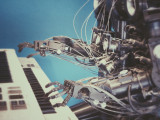
To stay ahead in the Data & AI landscape, companies should be able to make informed decisions to leverage the power of artificial intelligence. How can you start the journey to become data driven in order to remain or grow into an industry leader?
The organizations that surprise, delight and serve their customers best often do it with data-driven insights. In this fast virtual seminar you'll join other executives to get a strong overview on how data can transform your business, and how to get started.
Takeaways
Your challenges
A fast amount of (open source) data is available, you want to use this to generate insights to delight the service that you provide to your customers, but how to get started in your organization?
Your take-aways
You will have a better understanding what elements are important to start the data driven journey, which are the important roles and will have concrete examples of analytical use cases that you can pick up for your industry.
What to expect:
You can expect a program full of interaction and networking opportunity. You will learn which elements are important to start the data driven journey, and familiarize yourself with the different ways AI can support you transform your data into insights and more.
Part of a journey:
This event is part of a journey to become a data driven organization. As a follow-up Cumulus Park together with Go Data Driven will organize trainings for the Product Owners, and Professionals in your organization to play the role of Analytics Translators. A crucial role to take ideate and implement data driven decision making.
Stay up to date
Get notified about new updates, opportunities or events that match your interests.

